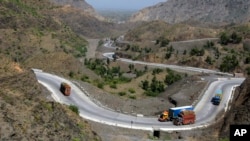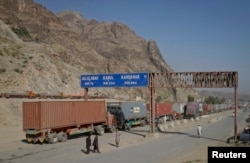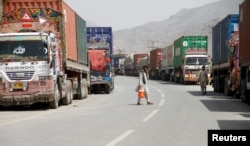Pakistan plans to inaugurate its newly built gate at a busy border crossing with Afghanistan on August 1, allowing authorities to effectively monitor and discourage illegal movement in either direction, officials said Monday.
Afghan objections to the construction of the gate at the Torkham crossing triggered days of border clashes between the two countries, in which four soldiers were killed and dozens more people, including civilians were wounded last month.
Major-General Abid Nazeer of the ministry of defense revealed the inauguration plans while briefing the Pakistan Senate Defense Committee on efforts to curb terrorist and illegal movements of people and vehicles along the 2,600-kilometer porous Afghan frontier, called the Durand Line.
The inaugural meeting of top military and civilian officials from the two countries to discuss border management and related security issues is to be held Tuesday in Kabul. The joint technical working group was formed last month to deal with mutual concerns and ensure future construction activities do not again trigger border skirmishes.
General Nazeer said that scanners and close circuit cameras (CCTV) have been installed to assist customs and officials of the federal investigating agency as well as other relevant security institutions to deployed at Torkham. He added that up 20,000 people travel across the crossing point.
He also informed lawmakers that authorities are taking additional steps to restrict movement of divided tribal families who can freely travel on both sides of the border using so-called “easement of rights” concessions granted to them since the the 2,600-kilometer frontier was drawn in 1893.
Defense Minister Khawaja Asif and representatives of relevant ministries also briefed the lawmakers. They said several other established crossings on the Afghan border are also being fenced and managed, and will have similar monitoring facilities. Measures to secure 200 other informal crossing points at the Durand Line are also under mutual discussions, they added.
“It (tight border monitoring) applies both ways. People coming from Afghanistan will be required to present valid travel documents, while it will also discourage illegal crossers from the Pakistani side," Minister Asif told the parliamentary committee.
Recent border skirmishes prompted closure of the Torkham border for several days, stranding thousands of travelers and trade convoys on both sides.
A one day closure of the border causes a 10 percent rise in the cost of essential commodities in Afghanistan, Asif told lawmakers. Afghan traders estimated millions of dollars in losses when border clashes suspended traffic at Torkham for four days in a row.
Afghan leaders have traditionally opposed Pakistani efforts to erect permanent structures on the border because they dispute the demarcation by the former British rulers of the Indian subcontinent as an international border.
But Islamabad insists it inherited the frontier when Pakistan gained independence from Britain in 1947 and treats the Durand Line as an international boundary.
Pakistani leaders also maintain that tight security along the border will address mutual concerns that terrorists and anti-government insurgents are crossing freely to carry out subversive acts in both countries.


